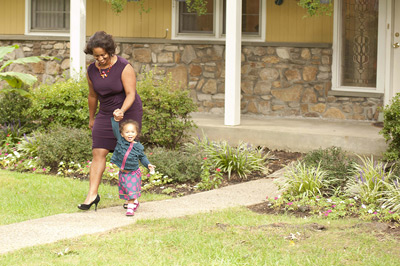
EARLY CHILDHOOD: Safety and Injury Prevention
SECTIONS: Home safety ~ Carseat safety ~ Sun protection ~ Fighting germs ~ Water safety ~ Preventing burns and fire safety ~ Gun safety ~ Stranger Safety
Toddlers require constant adult supervision. Don't rely on siblings, unless much older, to watch your young child.
 Home safety
Home safety
- Take into account your child's growing skills, abilities, and limitless curiosity. Put safety devices on windows and check them periodically to make sure they are still in place and working. Children love to tug on things, so be sure electrical outlets, wires, tablecloths, and small appliances are out of reach.
- Make sure any place your child stays is safe. This includes your home as well as grandparents' or child care providers' homes.
- Keep medicines and poisons locked and out of reach. Put the Poison Control Center number (800-222-1222) by every phone. Call them anytime you have a question.
- Toddlers are excellent climbers. Use gates at the top and bottom of stairs. Use window guards on upper level windows.
Carseat safety
- Use a safe carseat appropriate for your child's height and weight. Make sure it is installed correctly (see Safety Resources). Double check used carseats to make sure they meet current safety standards, have never been in a crash, and have not expired.
- The back seat is the safest place for children. Children up to age 2 (or maximum height and weight for the seat) should ride in rear-facing car seats.
- Everybody in the car should wear a safety belt. Don't start the car until everyone is buckled up, including you. Set a good example.
Sun protection
- Limit time in the sun. Some sun every day is a good way to get enough Vitamin D. Put sunscreen (SPF 15 or higher) on your child year round before going outside for more than 10-15 minutes. Use broad-brimmed hats to shade faces.
Fighting germs
- Help your child wash hands after diaper changes or toileting, and before eating. Wash your hands frequently, too, especially after being out in public.
- Teach your child to cough or sneeze into a shoulder and use tissues to wipe runny noses.
Water safety
- Watch constantly whenever your child is near water, including bathtubs, play pools, buckets, or toilets.
- Be sure that swimming pools in your community, apartment complex, or home have a 4-sided fence with a self-closing gate.
- Children should always wear a Coast Guard-approved life jacket when on a boat or other watercraft.
Preventing burns and fire safety
- Begin to teach your toddler the danger of hot objects. Keep him away from oven doors, heaters, and fireplaces. Put a barrier around them if possible. Turn your hot water heater below 120 degrees.
- Make sure you have working smoke and carbon monoxide detectors on every level of your home, especially in the furnace and sleeping areas. Test detectors every month.
- Develop—and practice—an escape plan for your family to get out quickly.
Gun safety
- The best way to keep your child safe from injury or death from guns is not to have a gun in your home. If there is a gun in your home, unload it and lock it away. Lock ammunition separately.
